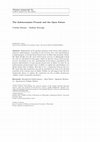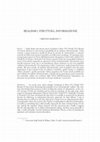Papers by Cristian Mariani

Synthese, 2021
Explanations of the genuine openness of the future often appeal to objective indeterminacy. Accor... more Explanations of the genuine openness of the future often appeal to objective indeterminacy. According to the received view, such indeterminacy is indeterminacy of certain future-tensed state of affairs that presently obtain. We shall call this view the weak indeterminate present, to distinguish it from the view we will defend in this paper, which we dub the strong indeterminate present. According to our view, unsettledness of the future is grounded on the present indeterminacy of some present-tensed state of affairs. In order for an indeterminate present-tensed state of affairs to explain the unsettledness of a future-tensed state of affairs, there has to be a connection between the two. We argue that this connection can only be provided if we look at the internal structure of the relevant state of affairs. Finally, we will suggest that the best background theory to explain the connection are the so-called spontaneous collapse models of quantum mechanics.
Studies in History and Philosophy of Science Part B: Studies in History and Philosophy of Modern Physics, 2020
Abstract The paper presents the first thorough investigation of quantum metaphysical indeterminac... more Abstract The paper presents the first thorough investigation of quantum metaphysical indeterminacy (MI) in the context of the Relational Interpretation of Quantum Mechanics (RQM). We contend that the interaction between MI and RQM is mutually beneficial. On the one hand, MI provides a metaphysical framework for RQM that has been neglected in the literature, and that promises to undermine some objections that are often raised against RQM. On the other hand, RQM might serve as an example of fundamental quantum MI.

Istituto Lombardo - Accademia di Scienze e Lettere - Incontri di Studio, 2019
The notion of law of nature has been a major focus on the recent philosophical debate on science.... more The notion of law of nature has been a major focus on the recent philosophical debate on science. In the attempt of determining what is the modal status of laws, whether they are necessary (as for necessitarianism) or contingent (as for contingentism), the recent debate has largely focused on the relationship between laws and natural properties. This contribution aims at defending a particular view on property individuation known as structuralism. According to structuralism, roughly, properties are individuated by their nomological/causal roles, and so by their relationships with the other properties and with the laws. In specific, I will defend a version of structuralism as a counterpart theory of property. Structuralism implies necessitarianism on laws of nature, and so this paper can be seen as a defense of this view as well.
The main research programs in quantum gravity tend to suggest in one way or another that most (if... more The main research programs in quantum gravity tend to suggest in one way or another that most (if not all) spacetime structures are not fundamental. At the same time, work in quantum foundations highlights fundamental features that are in tension with any straightforward spacetime understanding. This paper aims to explore the little investigated but potentially fruitful links between these two fields.

In this paper we consider the observables describing fundamental spatiotemporal properties and re... more In this paper we consider the observables describing fundamental spatiotemporal properties and relations in the context of Quantum Gravity (QG). As we will show, in both Loop Quantum Gravity and in String Theory, these observables are non-commuting ones. By analogy with some recent arguments put forward in the context of nonrelativistic quantum mechanics (QM), we shall propose to interpret these physical quantities as ontologically indeterminate—i.e., indeterminate in a non-epistemic, mindindependent way. This result has two important consequences for current debates in philosophy of physics. First, it shows that ontological indeterminacy may extend well beyond the non-relativistic case, thereby also suggesting a conceptual continuity between QM and QG. Second, when applied to QG, the notion of indeterminacy may provide a unified philosophical framework for understanding very distinct approaches that are usually considered incompatible.

The notion of Primitive Ontology (PO) has recently received a great deal of attention in the quan... more The notion of Primitive Ontology (PO) has recently received a great deal of attention in the quantum foundations literature. The PO is the fundamental ontology posited by a certain theory, what is out there in the world which makes the predictions of theory true. Can we make sense of the idea that the PO is indeterminate? And if we do, would this idea be explanatory useful in some way, or would it simply lead us too far from the very reasons we had to posit a PO in the first place? As I will show in this paper, these issues become of crucial importance when it comes to understanding what the ontology of the Mass Density approach to GRW (GRWM ) ultimately looks like. Proponents of the PO are never explicit in claiming that the determinacy is a requirement for the notion, yet arguably this is entailed by one of the criteria for a suitable PO, namely its being always well defined in every point in 3D space. I will argue that this requirement is however not satisfied in GRWM . The concl...
Analytic Philosophy, 2020

In recent years, many scholars (Ladyman & Ross [39]; Floridi [25]; Bynum [9]) have been discussin... more In recent years, many scholars (Ladyman & Ross [39]; Floridi [25]; Bynum [9]) have been discussing the possibility of an ‘informational’ realism. The common idea behind these projects is that of taking the notion of ‘information’ as the central concept of both our scientific practice and our ontology. At the same time, many experts in Quantum Information Theory (Lloyd [40]; Vedral [53]; Chiribella, D’Ariano & Perinotti [14]) have developed the idea that it is possible to ground all our physical theories by following an information-theoretic approach. In what follows, I aim at showing that it is still not at all clear what does it mean to be an ‘informational realist’. Consequently, I show the reasons why I believe is misleading to talk about informational realism as something that could actually supersede the most common forms of realism, namely the standard ‘object oriented’ and the structural ones. Finally, I suggest that the only plausible way to define informational realism, and...
Istituto Lombardo - Accademia di Scienze e Lettere - Incontri di Studio, Jul 19, 2017
The Mass Density approach to GRW (GRWm for short) has been widely discussed in the quantum founda... more The Mass Density approach to GRW (GRWm for short) has been widely discussed in the quantum foundations literature. A crucial feature of GRWm is the introduction of a relation of accessibility for mass, which allows to explain the determinacy of experimental outcomes thus also addressing the tails problem of GRW. However, the relation of accessibility leaves the ontological meaning of the non-accessible portion of mass utterly unexplained. In this paper I discuss two viable approaches to non-accessible mass, which I call anti-realist and realist, and will defend the latter. First, I show that the anti-realist approach suffers from various objections. Second, I develop an account of non-accessible mass density states as objectively indeterminate states of affairs.

Synthese
Explanations of the genuine openness of the future often appeal to objective indeterminacy. Accor... more Explanations of the genuine openness of the future often appeal to objective indeterminacy. According to the received view, such indeterminacy is indeterminacy of certain future-tensed state of affairs that presently obtain. We shall call this view the weak indeterminate present, to distinguish it from the view we will defend in this paper, which we dub the strong indeterminate present. According to our view, unsettledness of the future is grounded on the present indeterminacy of some present-tensed state of affairs. In order for an indeterminate present-tensed state of affairs to explain the unsettledness of a future-tensed state of affairs, there has to be a connection between the two. We argue that this connection can only be provided if we look at the internal structure of the relevant state of affairs. Finally, we will suggest that the best background theory to explain the connection are the so-called spontaneous collapse models of quantum mechanics.
Review of “James Harrington, Time: A Philosophical Introduction, London, Oxford, New York: Bloomsbury Academic, 2015, 304 pp., $23.00 (Paperback), ISBN 978-1472506474.” (with C. Mariani), Dialectica, 71, 4: 628-631
Uploads
Papers by Cristian Mariani